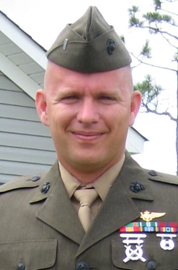Foster accounting master welcomes complexity as tax advisor and pilot

What do the US Marine Corps and UW Foster School’s Master of Professional Accounting have in common? Complex, unstructured real-world problems that Captain Dan Alger (MPAcc Taxation 2006) loves to tackle.
Alger is currently at the Marine Corps Air Station New River in Jacksonville, NC training to fly the largest helicopter in the US military—the CH-53E—for deployment to Afghanistan this spring. The CH-53E is used to carry heavy equipment, troops and critical supplies.
The Vancouver, WA native spent four years in the Marines after high school and through the GI Bill became the first in his family to go to college. He started at a community college and won entry to the University of Washington and the Foster School of Business in 2003 as an undergraduate. After blazing a trail through accounting, he entered the master’s degree program to boost his career potential.
The Master of Professional Accounting Program (MPAcc) at Foster is a rigorous one-year program designed to prepare accounting professionals with a quality education, strong ethics, innovative thinking, and excellent oral and written communication skills. The taxation track is competitive, enrolling only 45 students a year.
“I wanted to be able to have that future opportunity available to me and I knew that if I got the master’s degree I would be able to have a lot of those doors open up,” he said.
Alger said he enjoyed learning the complexities of tax code and seeing how through tax laws the federal government would motivate certain investments and behaviors by its citizens. “It’s like a big huge puzzle and you’re trying to figure out how to play a game where the rules can change at any time,” he said. “I really liked seeing how everything fit together.”
“Dan Alger was very intelligent and organized,” said Bill Resler, senior lecturer in accounting at Foster. “He was also an excellent teammate in his study group. It was clear that Dan was marked for success.”
As he excelled in the program, he began to line up corporate interviews. But the Marine Corps pull proved stronger.
Alger had traveled the world and enjoyed his first Marines experience. There was also something beyond personal fit: “A lot of it was growing up reading history books and seeing what other people had done for our country,” he said. “And I figured, you know, somebody has to do it. It might as well be me.”
So he entered Officer Candidate School and faced the rigors of officer training, plus the uncertainty of not making it through the program. “All the horror stories you hear about that stuff are pretty much true,” he said. “It’s like a ten-week job application full of nothing but pain.”
Once the Marines realized they not only had an officer in the making but also a tax expert, they put Alger in charge of a team to help other men and women in the military with their tax returns. His first year in officer training, Alger and seven others processed 1,500 tax returns. He still gets calls seeking tax advice from officers he helped years ago.
Not only did the MPAcc Program teach him about taxes and solving complex problems, but it also helped him gain valuable skills—such as public speaking—that have helped during his officer and pilot training.
“If you are going to give an order you have to stand up in front of a bunch of other people and say this is my plan – I need you to go forth and execute that. And, depending on your job in the Marine Corps you might be asking people to risk their lives for you,” he said. “In the masters program we practice speeches in front of our peers nearly every week.”
Alger will be stationed out of North Carolina for three to five more years. When he finishes training in spring 2011, he will find out what squadron he’ll lead and when they’ll be deployed to Afghanistan.
“The MPAcc Program isn’t just giving you the skills to land an entry-level job,” he concluded, “but also the skills to carry you further in your career many years after you have graduated.”
